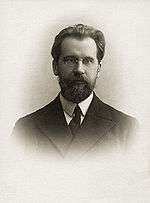Mykolas Biržiška

Mykolas Biržiška (![]() listen ; 24 August 1882 in Viekšniai – 24 August 1962 in Los Angeles), a Lithuanian editor, historian, professor of literature, diplomat, and politician, was one of the twenty signatories of the Act of Independence of Lithuania.
listen ; 24 August 1882 in Viekšniai – 24 August 1962 in Los Angeles), a Lithuanian editor, historian, professor of literature, diplomat, and politician, was one of the twenty signatories of the Act of Independence of Lithuania.
Born in a noble Lithuanian family Biržiška was twice expelled from gymnasium in Šiauliai after refusing to attend Orthodox services, and after organising a Lithuanian evening, although later was allowed to finish the studies.
He graduated from law school at the University of Moscow in 1907. He was arrested at a student meeting in 1902 for advocating Lithuanian causes and served part of a two-year sentence, but succeeded in regaining admission to the university. After returning to Vilnius, he became involved in the independence movement, frequently contributing articles to periodicals and later working with the War Relief Committee. at the time he was also working as assistant of Tadeusz Wróblewski. In 1915 he became principal of the first Lithuanian high school in Vilnius.
Together with his fellows he wrote a letter for US President Woodrow Wilson asking for support for Independence of Lithuania.
In 1918 he was elected a member of the Council of Lithuania, and signed the Act in 1918. He served briefly as Minister of Education in the Second Cabinet of Ministers, and was busy preparing to reopen Vilnius University.
During the events that preceded the concession of Vilnius to Poland in 1920, Biržiška acted as a negotiator. In summer 1921 he landed in court for an article in newspaper "Straż Litwy", and was defended by attorney Tadeusz Wróblewski. He was briefly arrested 1922 for protesting the outcome and served time in Lukiškės prison. In February 1922 he was charged with treason by the Polish government and sentenced to be shot; only intervention by the League of Nations saved him from this fate.[1][2] He was one of 32 Lithuanians formally expelled from Vilnius on September 20, 1922 and handed over to Lithuanian army.[3]
After this narrow escape he moved to Kaunas, the temporary capital, where he became a professor of literature at University of Lithuania. While a professor, he was an editor of the Lithuanian Encyclopedia, and participated in a number of social and cultural organizations. Biržiška then served as rector of Vilnius University from 1940 to March 1943, and in autumn 1944.[4]
After the second Soviet occupation in 1944, Biržiška went to West Germany, and was a professor at the Baltic University in Hamburg and Pinneberg. He moved to the United States in 1949. He pursued his earliest interests, folklore and folk dance, until his death in 1962.
Important works
- Lietuvių dainų literatūros istorija, 1919.
- Mūsų raštų istorija. 1547-1904, expanded later to "Mūsų raštų istorja (nuo 16 a iki 1864) (1925).
- Dainos kelias,1921.
- Barono gyvenimas ir raštai, 1924.
- Duonelaičio gyvenimas ir raštai, 1927.
- Rinktiniai mūsų senovės raštai, 1927.
- Together with his brother Vaclovas he prepared and published a work by Simonas Daukantas, Darbai senųjų lietuvių ir žemaičių, 1929.
- Aleksandrynas,3 vol. (1960-1965) Bibliography of Lithuanian writers up to 1865. Primarily Vaclovas' work, but Mykolas served as collaborator and editor after Vaclovas' death in 1956.
- Anuo metu Viekšniuose ir Šiauliuose (memoirs).
- Lietuviu Tautos Kelias 2 vol. written in exile in Los Angeles, 1952
Family
Biržiška belonged to an eminent noble family. His great-grandfather Mykolas Biržiška was a representative in the Sejm when the Constitution of May 3 was accepted in 1791; his grandfather Leonardas Biržiška was an active participant in the 1839-1831 Uprising; and his brothers, Vaclovas Biržiška and Viktoras Biržiška, were also leaders of the Lithuanian community. His father, the physician Antanas Biržiška, declined a professorship at the University of Moscow to practice medicine in the rural areas of Lithuania.
Notes
- ↑ "Mykolas Biržiška" (in Lithuanian). Seimas of Lithuania. Retrieved 2010-01-20.
Už aktyvų lietuvybės propagavimą buvo suimtas ir V. Kapsuko vyriausybės, o vėliau – ir lenkų valdžios. M. Biržišką norėta sušaudyti, tačiau Tautų Sąjungai įsikišus jis deportuotas į „Kauno Lietuvą“.
- ↑ "Professor Mykolas BIRŽIŠKA (1882 -1962)". Lituanus. Retrieved 2010-01-20.
- ↑ Čepėnas, Pranas (1986). Naujųjų laikų Lietuvos istorija. Chicago: Dr. Griniaus fondas. p. 656.
- ↑ lt icon "Vilniaus universiteto istorija". Vilniaus universitets. Retrieved 2008-08-08.
References
- "Biržiška, Mykolas". Encyclopedia Lituanica I: 364:365. (1970–1978). Ed. Simas Sužiedėlis. Boston, Massachusetts: Juozas Kapočius. LCC 74-114275.
- Biography at Lituanus magazine.
External links
|
